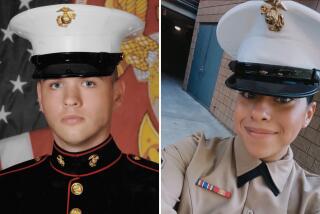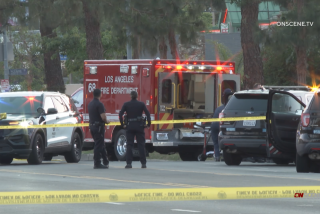U.S. Soldier on Trial for Murder
- Share via
HANAU, Germany — Firefights were crackling across sand-fringed roads and it was too dangerous to call in a medevac helicopter when a U.S. Army captain shot a wounded Iraqi insurgent in what was described as a “mercy killing,” according to testimony in a military court here Wednesday.
Capt. Rogelio Maynulet is charged with murder and dereliction of duty in the May 21 shooting of a driver whose car U.S. forces had been chasing in southern Iraq. The case offers a glimpse into the daily, treacherous encounters American soldiers and Iraqis face in a nation seething with unrest.
Maynulet, thought to be the first U.S. officer charged with murder in Iraq, was leading a tank company of the 1st Armored Division near the city of Najaf, where U.S. forces at the time were seeking to capture or kill radical Shiite Muslim cleric Muqtada Sadr.
Maynulet’s unit was pursuing a black sedan near the neighboring town of Kufa. Soldiers opened fire, wounding the driver and two passengers, including Sheik Mohammed Tabtabai, an aide to Sadr.
The car crashed into a house and U.S. forces closed in, arresting Tabtabai and an unidentified passenger and retrieving one pistol. The driver, Karim Hassan Abid Ali Haleji, a father of seven, had a severe head wound, soldiers testified Wednesday.
Maynulet, according to the testimony, determined that Haleji would not survive and that requesting a medical evacuation by helicopter in such chaos would have endangered his soldiers.
The captain then shot Haleji “at close range.” According to the U.S. government, a pilotless plane on patrol recorded the scene with a video camera. The 10-minute footage is classified, and reporters were asked to leave the courtroom when it was shown on a screen as Maynulet, a solidly built man in green fatigues, sat in front of his wife, a Black Hawk helicopter pilot.
While questioning Lt. Colin Cremin, the tank company’s executive officer, prosecutor Capt. Daniel Sennott noted that the defendant had told Cremin that “ ‘half [of Haleji’s] brain was hanging out ... and that nothing could be done for him,’ and at that point Capt. Maynulet told you that he stepped back and shot him in the base of the neck or the back of the head.”
When asked whether that was an accurate description, Cremin, who had not witnessed the incident, responded, “Ballpark.”
“It was something [Maynulet] didn’t want to do. It was a compassionate response. I think it was a humane response,” Cremin testified.
Cremin said that two days after the incident, Maynulet told him: “I wouldn’t be surprised if there’s some type of negative” disciplinary action.
Under military law, a so-called mercy killing of a wounded insurgent is “a violation of the rules of engagement,” Sennott said.
Eight witnesses testified in Hanau in the first of three days of hearings to determine whether Maynulet should be court-martialed, but Haleji’s family members in Iraq gave a different version of events. They denied that Haleji was an insurgent or a member of Sadr’s Al Mahdi militia. They described him as a bricklayer whose BMW had caught the eye of Tabtabai, who hired him each week to drive him from Baghdad to Najaf and Kufa for prayers and meetings.
Haleji’s brother, Niema, said that on May 21 Haleji and Tabtabai had left the Kufa mosque intending to visit Sadr’s office in Najaf.
“There was a helicopter flying,” Niema said. “When the car reached an American checkpoint, they were surprised when the soldiers opened fire at their car.... My brother did not stop. He tried to drive faster to be safe. He drove on unpaved road. The American vehicles followed them, the helicopter also; shooting was still going on and all parts of the car were hit with bullets.”
By the time the BMW struck the house, Niema said, his brother had been shot in the leg. Haleji squeezed out from behind the car’s air bag, Niema said, “and eyewitnesses said that [my brother] was shot by an American officer by one bullet to his head while he was trying to enter the house. The car was between the American officer and my brother. He fell down on the left side of the car, spots of blood covered the driver’s seat.”
Haleji’s death certificate states he died at 3 p.m. with a bullet wound to the head.
The circumstances that drew Maynulet and Haleji together are part of the grisly and confusing Iraqi panorama. Many U.S. soldiers, according to testimony Wednesday, carry guns that frequently jam and assume duties they are not always trained for. The 56 soldiers in Maynulet’s tank company were often relegated to infantry and foot patrol duties -- tasks made difficult because only 28 of the soldiers carried M-4 rifles.
A highly praised tank commander, Maynulet was described in testimony as a sharp thinking officer who engaged Iraqi neighborhood leaders, helped obtain $500,000 in coalition funds for public works projects and gathered intelligence that led to the arrests of 1,000 insurgents. He and his unit were accustomed to combat: They had battled in the potholed streets of Baghdad and fought Sadr’s militia for six hours in a Najaf cemetery.
Prosecutors, however, portrayed Maynulet as a maverick who once broke into an Iraqi police station to retrieve a U.S. interpreter’s identity card. They suggested that when he allegedly shot Haleji, the driver was wounded and no longer a danger.
Testimony from several 1st Armored Division soldiers -- all supportive of Maynulet -- said there was heavy gunfire in the region May 21. Capt. John Moore said Sadr’s forces ambushed his unit two miles south of Maynulet’s company. In a five-minute battle, his soldiers fired 200 .50-caliber rounds, 300 rounds from other guns and three 65-pound tank rounds, he said.
When asked by Maynulet’s lawyer, Capt. William Helixon, whether it would have been safe for a medevac helicopter to enter the area, Moore said: “I would not call U.S. troops forward and put their lives at risk.”
Helixon has asked that the aerial footage be declassified “so the public can evaluate the quality of the government evidence.”
If convicted of murder, Maynulet, who grew up in Illinois, could face a life sentence with the possibility of parole.
*
Fleishman reported from Hanau and Salman from Baghdad.
More to Read
Sign up for Essential California
The most important California stories and recommendations in your inbox every morning.
You may occasionally receive promotional content from the Los Angeles Times.











